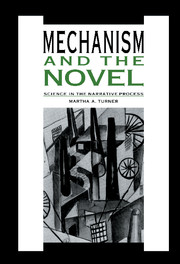Book contents
- Frontmatter
- Contents
- Acknowledgments
- 1 Introduction
- 2 The concept of mechanism
- 3 The Aristotelian logic of settlement in Austen's Pride and Prejudice
- 4 Scott's The Bride of Lammermoor: empiricism, mechanism, imagination
- 5 Cosmology and chaos in Dickens's Bleak House
- 6 Scientific humanism and the Comic Spirit: from The Ordeal of Richard Feverel to The Egoist
- 7 Old mindsets and new world-music in Conrad's The Secret Agent
- 8 Women in Love: beyond fulfillment
- 9 The mechanistic legacy: Lessing's Canopus in Argos: Archives
- Notes
- Bibliography
- Index
7 - Old mindsets and new world-music in Conrad's The Secret Agent
Published online by Cambridge University Press: 19 January 2010
- Frontmatter
- Contents
- Acknowledgments
- 1 Introduction
- 2 The concept of mechanism
- 3 The Aristotelian logic of settlement in Austen's Pride and Prejudice
- 4 Scott's The Bride of Lammermoor: empiricism, mechanism, imagination
- 5 Cosmology and chaos in Dickens's Bleak House
- 6 Scientific humanism and the Comic Spirit: from The Ordeal of Richard Feverel to The Egoist
- 7 Old mindsets and new world-music in Conrad's The Secret Agent
- 8 Women in Love: beyond fulfillment
- 9 The mechanistic legacy: Lessing's Canopus in Argos: Archives
- Notes
- Bibliography
- Index
Summary
At the beginning of chapter three of The Secret Agent, Michaelis, “the ticket-of-leave apostle,” expounds his deterministic view of history:
All idealization makes life poorer. To beautify it is to take away its character of complexity – it is to destroy it … History is made by men, but they do not make it in their heads. The ideas that are born in their consciousness play an insignificant part in the march of events. History is dominated and determined by the tool and the production – by the force of economic conditions.
Like Dr. Moynihan in Nostromo, Michaelis looks upon a world in which “material interests” direct people and determine events; man has no real control over the conditions of his existence.
Michaelis's speech is beset with ironies. For one thing, the anarchist professes allegiance to the complex dynamics of “real” material existence and denounces “idealization,” but his own philosophy is extremely idealized. Evolved in the isolation of his prison confinement, Michaelis's vision seems utterly incommensurable with the dark and grimy everyday London of the novel. Furthermore, as the narrator slyly notes, Michaelis's philosophy cannot even withstand the vicissitudes of ordinary conversation. Any interruption confuses him, shattering “that sentiment of isolation necessary for the continuity of his thought” (49). Even more ironically, Michaelis's beatific vision is in a way nothing more than a defense of his own slothfulness.
- Type
- Chapter
- Information
- Mechanism and the NovelScience in the Narrative Process, pp. 119 - 134Publisher: Cambridge University PressPrint publication year: 1993



